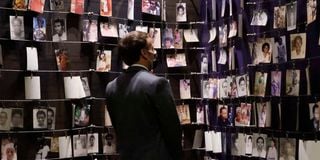Rwanda genocide on trial at home and abroad

French President Emmanuel Macron looks at the images of genocide victims on display during his visit to the Kigali Genocide Memorial, where some 250,000 victims of the massacres are buried, in Kigali on May 27, 2021.
One of the last top suspects in the 1994 Rwandan genocide, Felicien Kabuga, goes on trial Thursday in The Hague for allegedly bankrolling the slaughter of some 800,000 people, mostly ethnic Tutsis.
AFP takes a look at the other convictions secured by courts in Rwanda and around the world.
The International Criminal Tribunal for Rwanda (ICTR) was set up by the United Nations in the Tanzanian town of Arusha just months after the bloodshed.
In September 1998 it handed down the world's first genocide conviction at an international tribunal when it sentenced former mayor Jean-Paul Akayesu to life in prison.
In all, it sentenced 62 people before closing down in late 2015, after which its work was taken over by the Hague-based International Residual Mechanism for Criminal Tribunals.
Kabuga, who was arrested near Paris in 2020 after 25 years on the run, is accused of helping to create the Hutu Interahamwe militia, the main armed group involved in the massacres, according to the UN.
Rwanda started trying genocide suspects in 1996 and on a single day in April 1998 had 22 executed by firing squad.
It abolished the death penalty in 2007, lifting the main obstacle for the ICTR to transfer genocide suspects to Rwanda for trial.
Since 2017, three defendants who have returned to Kigali have received life sentences.
Between 2005 and 2012, more than 12,000 "gacaca" grassroots courts have put nearly two million people on trial, convicting 65 percent and sending most to prison.
Belgium, the former colonial power in Rwanda, was the first European country to begin trying genocide suspects living in its territory in 2001 when it sentenced four people, including two Catholic nuns, to long prison terms for their role in the killings.
The case was the first under a Belgian law giving its courts jurisdiction in war crimes cases, irrespective of where they were committed.
Four trials since have seen two former businessmen convicted of war crimes, an army major jailed for murders of 10 Belgian peacekeepers, a Rwandan former banker imprisoned for murders and rapes, and finally, in 2019 a former senior government official convicted of genocide -- the first-ever such conviction in Belgium.
More convictions
In France, one of the top destinations for fugitives from the massacres, the first trial only took place in 2014, when former spy chief Pascal Simbikangwa was sentenced to 25 years in prison by a Paris court.
Two years later, the former mayors of two Rwandan villages, Octavien Ngenzi and Tito Barahira, were sentenced to life in prison over their role in the massacre of around 2,000 people in a church.
France has also tried former hotel chauffeur Claude Muhayimana, who was given a 14-year jail term in December 2021 for transporting militiamen, and Laurent Bucyibaruta, a former top Rwandan official, who was sentenced to 20 years in prison in July 2022.
A dozen more convictions have been handed down by courts in Canada, Finland, Germany, the Netherlands, Norway, Sweden and the United States.
The first conviction in the US was of a Rwandan woman who lied about her role in the genocide to gain entry to the US and apply for citizenship.
She was given a 10-year jail term in 2013.





